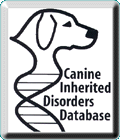
Histiocytic ulcerative colitis
Colitis means inflammation of the large intestine. Histiocytic colitis is one form of inflammatory bowel disease (IBD), in this case associated with infiltration of inflammatory cells (histiocytes) into the intestinal wall which is thought to be due to a defect in immune regulation. The result is chronic large bowel diarrhea.
This disorder has some similarities to Crohn's disease in people.
unknown
This condition generally develops in young dogs (less than 1 year). Because this is a problem in the large intestine, your dog will have signs such as an increased frequency of passing stool (although the volume may be normal), straining to defecate, and the presence of blood or mucous in the stool. There is usually an increased sense of urgency for your dog, which often means "accidents" in the house. There may be intermittent vomiting, lethargy, loss of appetite and weight loss.
There are many disorders that cause chronic diarrhea in dogs, so diagnosis is not simple. Your answers to questions about frequency and appearance of the increased stool will help point your veterinarian towards large bowel disease. S/he will do blood and fecal tests for parasites, bacterial infections and other possible causes. An intestinal biopsy is necessary for a definitive diagnosis of histiocytic ulcerative colitis. This involves surgical removal of small samples of your dog's intestinal wall for examination by a veterinary pathologist.
This disorder is difficult to control. Treatment consists of dietary management, and immunosuppressive and anti-inflammatory drugs to reduce the intestinal inflammation. The diet should be free of additives and preservatives and contain an adequate (but not excessive) amount of highly digestible protein, with supplementation of fiber. Your veterinarian will recommend an appropriate commercial diet or provide a recipe for a homemade diet that meets these requirements.
For the veterinarian: Treatment is largely empiric. Anti-inflammatory drugs such as corticosteroids, sulfasalazine, and metronidazole are used, often in combination. Other immunosuppressive drugs may be tried if prednisone fails. Newer drugs are also being tried for treatment of Crohn's disease in people, that may prove useful in dogs.
Colonoscopy may show evidence of the disease (increased mucosal granularity, friability and diffuse erosions) but histopathology is necessary for a definitive diagnosis, and will show a mixed inflammatory cellular infiltrate with PAS-positive histiocytes.
Affected dogs should not be bred and until more is known about inheritance of this disorder, it is prudent to avoid breeding their parents and siblings as well.
FOR MORE INFORMATION ABOUT THIS DISORDER, PLEASE SEE YOUR VETERINARIAN.
Dimski, D.S. 1995. Therapy of inflammatory bowel disease. In J.D. Bonagura and R.W. Kirk (eds.) Kirk's Current Vet. Therapy XII Small Animal Practice. pp. 723-728. W.B. Saunders Co., Toronto.
Jergens, A.E. and Willard, M.D. 2000. Diseases of the large intestine. In E.J. Ettinger and E.C. Feldman (eds.) Textbook of Veterinary Internal Medicine, Chapter 138. W.B. Saunders Co., Toronto.
- Disorder Type:

